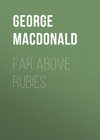Kitobni o'qish: «Salted with Fire»
CHAPTER I
“Whaur are ye aff til this bonny mornin’, Maggie, my doo?” said the soutar, looking up from his work, and addressing his daughter as she stood in the doorway with her shoes in her hand.
“Jist ower to Stanecross, wi’ yer leave, father, to speir the mistress for a goupin or twa o’ chaff: yer bed aneth ye’s grown unco hungry-like.”
“Hoot, the bed’s weel eneuch, lassie!”
“Na, it’s onything but weel eneuch! It’s my pairt to luik efter my ain father, and see there be nae k-nots aither in his bed or his parritch.”
“Ye’re jist yer mither owre again, my lass!—Weel, I winna miss ye that sair, for the minister ‘ill be in this mornin’.”
“Hoo ken ye that, father?”
“We didna gree vera weel last nicht.”
“I canna bide the minister—argle-barglin body!”
“Toots, bairn! I dinna like to hear ye speyk sae scornfulike o’ the gude man that has the care o’ oor sowls!”
“It wad be mair to the purpose ye had the care o’ his!”
“Sae I hae: hasna ilkabody the care o’ ilk ither’s?”
“Ay; but he preshumes upo’ ‘t—and ye dinna; there’s the differ!”
“Weel, but ye see, lassie, the man has nae insicht—nane to speak o’, that is; and it’s pleased God to mak him a wee stoopid, and some thrawn (twisted). He has nae notion even o’ the wark I put intil thae wee bit sheenie (little shoes) o’ his—that I’m this moment labourin ower!”
“It’s sair wastit upo’ him ‘at caana see the thoucht intil’t!”
“Is God’s wark wastit upo’ you and me excep’ we see intil’t, and un’erstan’t, Maggie?”
The girl was silent. Her father resumed.
“There’s three concernt i’ the matter o’ the wark I may be at: first, my ain duty to the wark—that’s me; syne him I’m working for—that’s the minister; and syne him ‘at sets me to the wark—ye ken wha that is: whilk o’ the three wad ye hae me lea’ oot o’ the consideration?”
For another moment the girl continued silent; then she said—
“Ye maun be i’ the richt, father! I believe ‘t, though I canna jist see ‘t. A body canna like a’body, and the minister’s jist the ae man I canna bide.”
“Ay could ye, gi’en ye lo’ed the ane as he oucht to be lo’ed, and as ye maun learn to lo’e him.”
“Weel I’m no come to that wi’ the minister yet!”
“It’s a trowth—but a sair pity, my dautie (daughter—darling).”
“He provokes me the w’y that he speaks to ye, father—him ‘at’s no fit to tie the thong o’ your shee!”
“The Maister would lat him tie his, and say thank ye!”
“It aye seems to me he has sic a scrimpit way o’ believin’! It’s no like believin’ at a’! He winna trust him for naething that he hasna his ain word, or some ither body’s for! Ca’ ye that lippenin’ til him?”
It was now the father’s turn to be silent for a moment. Then he said,—
“Lea’ the judgin’ o’ him to his ain maister, lassie. I ha’e seen him whiles sair concernt for ither fowk.”
“‘At they wouldna hand wi’ him, and war condemnt in consequence—wasna that it?”
“I canna answer ye that, bairn.”
“Weel, I ken he doesna like you—no ae wee bit. He’s aye girdin at ye to ither fowk!”
“May be: the mair’s the need I sud lo’e him.”
“But noo can ye, father?”
“There’s naething, o’ late, I ha’e to be sae gratefu’ for to Him as that I can. But I confess I had lang to try sair!”
“The mair I was to try, the mair I jist couldna.”
“But ye could try; and He could help ye!”
“I dinna ken; I only ken that sae ye say, and I maun believe ye. Nane the mair can I see hoo it’s ever to be broucht aboot.”
“No more can I, though I ken it can be. But just think, my ain Maggie, hoo would onybody ken that ever ane o’ ‘s was his disciple, gien we war aye argle-barglin aboot the holiest things—at least what the minister coonts the holiest, though may be I think I ken better? It’s whan twa o’ ‘s strive that what’s ca’d a schism begins, and I jist winna, please God—and it does please him! He never said, Ye maun a’ think the same gait, but he did say, Ye man a’ loe are anither, and no strive!”
“Ye dinna aye gang to his kirk, father!”
“Na, for I’m jist feared sometimes lest I should stop loein him. It matters little about gaein to the kirk ilka Sunday, but it matters a heap aboot aye loein are anither; and whiles he says things aboot the mind o’ God, sic that it’s a’ I can dee to sit still.”
“Weel, father, I dinna believe that I can lo’e him ony the day; sae, wi’ yer leave, I s’ be awa to Stanecross afore he comes.”
“Gang yer wa’s, lassie, and the Lord gang wi’ ye, as ance he did wi’ them that gaed to Emmaus.”
With her shoes in her hand, the girl was leaving the house when her father called after her—
“Hoo’s folk to ken that I provide for my ain, whan my bairn gangs unshod? Tak aff yer shune gin ye like when ye’re oot o’ the toon.”
“Are ye sure there’s nae hypocrisy aboot sic a fause show, father?” asked Maggie, laughing, “I maun hide them better!”
As she spoke she put the shoes in the empty bag she carried for the chaff. “There’s a hidin’ o’ what I hae—no a pretendin’ to hae what I haena!—Is’ be hame in guid time for yer tay, father.—I can gang a heap better withoot them!” she added, as she threw the bag over her shoulder. “I’ll put them on whan I come to the heather,” she concluded.
“Ay, ay; gang yer wa’s, and lea’ me to the wark ye haena the grace to adverteeze by weirin’ o’ ‘t.”
Maggie looked in at the window as she passed it on her way, to get a last sight of her father. The sun was shining into the little bare room, and her shadow fell upon him as she passed him; but his form lingered clear in the close chamber of her mind after she had left him far. And it was not her shadow she had seen, but the shadow, rather, of a great peace that rested concentred upon him as he bowed over his last, his mind fixed indeed upon his work, but far more occupied with the affairs of quite another region. Mind and soul were each so absorbed in its accustomed labour that never did either interfere with that of the other. His shoemaking lost nothing when he was deepest sunk in some one or other of the words of his Lord, which he sought eagerly to understand—nay, I imagine his shoemaking gained thereby. In his leisure hours, not a great, he was yet an intense reader; but it was nothing in any book that now occupied him; it was the live good news, the man Jesus Christ himself. In thought, in love, in imagination, that man dwelt in him, was alive in him, and made him alive. This moment He was with him, had come to visit him—yet was never far from him—was present always with an individuality that never quenched but was continually developing his own. For the soutar absolutely believed in the Lord of Life, was always trying to do the things he said, and to keep his words abiding in him. Therefore was he what the parson called a mystic, and was the most practical man in the neighbourhood; therefore did he make the best shoes, because the Word of the Lord abode in him.
The door opened, and the minister came into the kitchen. The soutar always worked in the kitchen, to be near his daughter, whose presence never interrupted either his work or his thought, or even his prayers—which often seemed as involuntary as a vital automatic impulse.
“It’s a grand day!” said the minister. “It aye seems to me that just on such a day will the Lord come, nobody expecting him, and the folk all following their various callings—as when the flood came and astonished them.”
The man was but reflecting, without knowing it, what the soutar had been saying the last time they encountered; neither did he think, at the moment, that the Lord himself had said something like it first.
“And I was thinkin, this vera meenute,” returned the soutar, “sic a bonny day as it was for the Lord to gang aboot amang his ain fowk. I was thinkin maybe he was come upon Maggie, and was walkin wi’ her up the hill to Stanecross—nearer til her, maybe, nor she could hear or see or think!”
“Ye’re a deal taen up wi’ vain imaiginins, MacLear!” rejoined the minister, tartly. “What scriptur hae ye for sic a wanderin’ invention, o’ no practical value?”
“‘Deed, sir, what scriptur hed I for takin my brakwast this mornin, or ony mornin? Yet I never luik for a judgment to fa’ upon me for that! I’m thinkin we dee mair things in faith than we ken—but no eneuch! no eneuch! I was thankfu’ for’t, though, I min’ that, and maybe that’ll stan’ for faith. But gien I gang on this gait, we’ll be beginnin as we left aff last nicht, and maybe fa’ to strife! And we hae to loe ane anither, not accordin to what the ane thinks, or what the ither thinks, but accordin as each kens the Maister loes the ither, for he loes the twa o’ us thegither.”
“But hoo ken ye that he’s pleased wi’ ye?”
“I said naething aboot that: I said he loes you and me!”
“For that, he maun be pleast wi’ ye!”
“I dinna think nane aboot that; I jist tak my life i’ my han’, and awa’ wi’ ‘t til Him;—and he’s never turned his face frae me yet.—Eh, sir! think what it would be gien ever he did!”
“But we maunna think o’ him ither than he would hae us think.”
“That’s hoo I’m aye hingin aboot his door, luikin for him.”
“Weel, I kenna what to mak o’ ye! I maun jist lea’ ye to him!”
“Ye couldna dee a kinder thing! I desire naething better frae man or minister than be left to Him.”
“Weel, weel, see til yersel.”
“I’ll see to him, and try to loe my neebour—that’s you, Mr. Pethrie. I’ll hae yer shune ready by Setterday, sir. I trust they’ll be worthy o’ the feet that God made, and that hae to be shod by me. I trust and believe they’ll nowise distress ye, sir, or interfere wi’ yer comfort in preachin. I’ll fess them hame mysel, gien the Lord wull, and that without fail.”
“Na, na; dinna dee that; lat Maggie come wi’ them. Ye wad only be puttin me oot o’ humour for the Lord’s wark wi’ yer havers!”
“Weel, I’ll sen’ Maggie—only ye wad obleege me by no seein her, for ye micht put her oot o’ humour, sir, and she michtna gie yer sermon fair play the morn!”
The minister closed the door with some sharpness.
CHAPTER II
In the meantime, Maggie was walking shoeless and bonnetless up the hill to the farm she sought. It was a hot morning in June, tempered by a wind from the north-west. The land was green with the slow-rising tide of the young corn, among which the cool wind made little waves, showing the brown earth between them on the somewhat arid face of the hill. A few fleecy clouds shared the high blue realm with the keen sun. As she rose to the top of the road, the gable of the house came suddenly in sight, and near it a sleepy old gray horse, treading his ceaseless round at the end of a long lever, too listless to feel the weariness of a labour that to him must have seemed unprogressive, and, to anything young, heart-breaking. Nor did it appear to give him any consolation to be aware of the commotion he was causing on the other side of the wall, where a threshing machine of an antiquated sort responded with multiform movement to the monotony of his round-and-round.
Near by, a peacock, as conscious of his glorious plumage as indifferent to the ugliness of his feet, kept time with undulating neck to the motion of those same feet, as he strode with stagey gait across the cornyard, now and then stooping to pick up a stray grain spitefully, and occasionally erecting his superb neck to give utterance to a hideous cry of satisfaction at his own beauty—a cry as unlike the beauty as ever was discord to harmony. His glory, his legs and his voice, perplexed Maggie with an unanalyzed sense of contradiction and unfitness.
Radiant with age and light, the old horse stood still just as the sun touched the meridian; the hour of repose and food was come, and he knew it; and at the same moment the girl, passing one of the green-painted doors of the farm house, stopped at the other, the kitchen one. It stood open, and in answer to her modest knock, a ruddy maid appeared, with a question in her eyes, and a smile on her lips at sight of the shoemaker’s Maggie, whom she knew well. Maggie asked if She might see the mistress.
“Here’s soutar’s Maggie wanting ye, mem!” said the maid and Mistress Blatherwick who was close at hand, came; to which Maggie humbly but confidently making her request had it as kindly granted, and followed her to the barn to fill her pock with the light plumy covering of the husk of the oats, the mistress of Stonecross helping her the while and talking to her as she did so—for the soutar and his daughter were favourites with her and her husband, and they had not seen either of them for some while.
“Ye used to ken oor Maister Jeames I’ the auld land-syne, Maggie!” for the two has played together as children in the same school although growth and difference in station had gradually put and end to their intimacy so that it became the mother to refer to him with circumspection, seeing that, in her eyes at least, Maister Jeames was now far on the way to becoming a great man, being a divinity student; for in the Scotch church, although it sets small store on apostolitic descent, every Minister, until he has shown himself eccentic or incapable of interesting a congregation, is regarded with quite as much respect as in England is accorded to the claimant of a phantom-priesthood; and therefore, prospectively, Jeames was to his mother a man of no little note. Maggie remembered how, when a boy, he had liked to talk with her father; and how her father would listen to him with a curious look on his rugged face, while the boy set forth the commonplaces of a lifeless theology with an occasional freshness of logical presentation that at least interested himself. But she remembered also that she had never heard the soutar on his side make any attempt to lay open to the boy his stores of what one or two in the place, one or two only, counted wisdom and knowledge.
“He’s a gey clever laddie,” he had said once to Maggie, “and gien he gets his een open i’ the coorse o’ the life he’s hardly yet ta’en hand o’, he’ll doobtless see something; but he disna ken yet that there’s onything rael to be seen, ootside or inside o’ him!” When he heard that he was going to study divinity, he shook his head, and was silent.
“I’m jist hame frae peyin him a short veesit,” Mrs. Blatherwick went on. “I cam hame but twa nichts ago. He’s lodged wi’ a dacent widow in Arthur Street, in a flat up a lang stane stair that gangs roun and roun till ye come there, and syne gangs past the door and up again. She taks in han’ to luik efter his claes, and sees to the washin o’ them, and does her best to hand him tidy; but Jeamie was aye that partic’lar aboot his appearance! And that’s a guid thing, special in a minister, wha has to set an example! I was sair pleased wi’ the auld body.”
There was one in the Edinburgh lodging, however, of whom Mrs. Blatherwick had but a glimpse, and of whom, therefore, she had made no mention to her husband any more than now to Maggie MacLear; indeed, she had taken so little notice of her that she could hardly be said to have seen her at all—a girl of about sixteen, who did far more for the comfort of her aunt’s two lodgers than she who reaped all the advantage. If Mrs. Blatherwick had let her eyes rest upon her but for a moment, she would probably have looked again; and might have discovered that she was both a good-looking and graceful little creature, with blue eyes, and hair as nearly black as that kind of hair, both fine and plentiful, ever is. She might then have discovered as well a certain look of earnestness and service that would at first have attracted her for its own sake, and then repelled her for James’s; for she would assuredly have read in it what she would have counted dangerous for him; but seeing her poorly dressed, and looking untidy, which at the moment she could not help, the mother took her for an ordinary maid-of-all-work, and never for a moment doubted that her son must see her just as she did. He was her only son; her heart was full of ambition for him; and she brooded on the honour he was destined to bring her and his father. The latter, however, caring less for his good looks, had neither the same satisfaction in him nor an equal expectation from him. Neither of his parents, indeed, had as yet reaped much pleasure from his existence, however much one of them might hope for in the time to come. There were two things indeed against such satisfaction or pleasure—that James had never been open-hearted toward them, never communicative as to his feelings, or even his doings; and—which was worse—that he had long made them feel in him a certain unexpressed claim to superiority. Nor would it have lessened their uneasiness at this to have noted that the existence of such an implicit claim was more or less evident in relation to every one with whom he came in contact, manifested mainly by a stiff, incommunicative reluctance, taking the form now of a pretended absorption in his books, now of contempt for any sort of manual labour, even to the saddling of the pony he was about to ride; and now and always by an affectation of proper English, which, while successful as to grammar and accentuation, did not escape the ludicrous in a certain stiltedness of tone and inflection, from which intrusion of the would-be gentleman, his father, a simple, old-fashioned man, shrank with more of dislike than he was willing to be conscious of.
Quite content that, having a better education than himself, his son should both be and show himself superior, he could not help feeling that these his ways of asserting himself were signs of mere foolishness, and especially as conjoined with his wish to be a minister—in regard to which Peter but feebly sympathized with the general ambition of Scots parents. Full of simple paternal affection, whose utterance was quenched by the behaviour of his son, he was continuously aware of something that took the shape of an impassable gulf between James and his father and mother. Profoundly religious, and readily appreciative of what was new in the perception of truth, he was, above all, of a great and simple righteousness—full, that is, of a loving sense of fairplay—a very different thing indeed from that which most of those who count themselves religious mean when they talk of the righteousness of God! Little, however, was James able to see of this, or of certain other great qualities in his father. I would not have my reader think that he was consciously disrespectful to either of his parents, or knew that his behaviour was unloving. He honoured their character, indeed, but shrank from the simplicity of their manners; he thought of them with no lively affection, though not without some kindly feeling and much confidence—at the same time regarding himself with still greater confidence. He had never been an idler, or disobedient; and had made such efforts after theological righteousness as served to bolster rather than buttress his conviction that he was a righteous youth, and nourished his ignorance of the fact that he was far from being the person of moral strength and value that he imagined himself. The person he saw in the mirror of his self-consciousness was a very fine and altogether trustworthy personage; the reality so twisted in its reflection was but a decent lad, as lads go, with high but untrue notions of personal honour, and an altogether unwarranted conviction that such as he admiringly imagined himself, such he actually was: he had never discovered his true and unworthy self! There were many things in his life and ways upon which had he but fixed eyes of question, he would at once have perceived that they were both judged and condemned; but so far, nevertheless, his father and mother might have good hope of his future.
It is folly to suppose that such as follow most the fashions of this world are more enslaved by them than multitudes who follow them only afar off. These reverence the judgments of society in things of far greater importance than the colour or cut of a gown; often without knowing it, they judge life, and truth itself, by the falsest of all measures, namely, the judgment of others falser than themselves; they do not ask what is true or right, but what folk think and say about this or that. James, for instance, altogether missed being a gentleman by his habit of asking himself how, in such or such circumstances, a gentleman would behave. As the man of honour he would fain know himself, he would never tell a lie or break a promise; but he had not come to perceive that there are other things as binding as the promise which alone he regarded as obligatory. He did not, for instance, mind raising expectations which he had not the least intention of fulfilling.
Being a Scotch lad, it is not to be wondered at that he should turn to Theology as a means of livelihood; neither is it surprising that he should do so without any conscious love to God, seeing it is not in Scotland alone that untrue men take refuge in the Church, and turn the highest of professions into the meanest, laziest, poorest, and most unworthy, by following it without any genuine call to the same. In any profession, the man must be a poor common creature who follows it without some real interest in it; but he who without a spark of enthusiasm for it turns to the Church, is either a “blind mouth,” as Milton calls him—scornfullest of epithets, or an “old wife” ambitious of telling her fables well; and James’s ambition was of the same contemptible sort—that, namely, of distinguishing himself in the pulpit. This, if he had the natural gift of eloquence, he might well do by its misuse to his own glory; or if he had it not, he might acquire a spurious facility resembling it, and so be every way a mere windbag.
Mr. Petrie, whom it cost the soutar so much care and effort to love, and who, although intellectually small, was yet a good man, and by no means a coward where he judged people’s souls in danger, thought to save the world by preaching a God, eminently respectable to those who could believe in such a God, but to those who could not, a God far from lovely because far from righteous. His life, nevertheless, showed him in many ways a believer in Him who revealed a very different God indeed from the God he set forth. His faith, therefore, did not prevent him from looking upon the soutar, who believed only in the God he saw in Jesus Christ, as one in a state of rebellion against him whom Jesus claimed as his father.
Young Blatherwick had already begun to turn his back upon several of the special tenets of Calvinism, without, however, being either a better or a worse man because of the change in his opinions. He had cast aside, for instance, the doctrine of an everlasting hell for the unbeliever; but in doing so he became aware that he was thus leaving fallow a great field for the cultivation of eloquence; and not having yet discovered any other equally productive of the precious crop, without which so little was to be gained for the end he desired—namely, the praise of men, he therefore kept on, “for the meantime,” sowing and preparing to reap that same field. Mr. Petrie, on the other hand, held the doctrine as absolutely fundamental to Christianity, and preached it with power; while the soutar, who had discarded it from his childhood, positively refused, jealous of strife, to enter into any argument upon it with the disputatious little man.
As yet, then, James was reading Scotch metaphysics, and reconciling himself to the concealment of his freer opinions, upon which concealment depended the success of his probation, and his license. But the close of his studies in divinity was now near at hand.



















